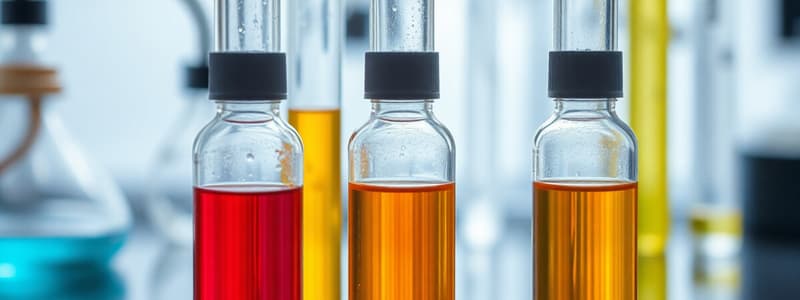Podcast
Questions and Answers
What is the term chromatography classified as?
What is the term chromatography classified as?
- An adsorption term
- An umbrella term (correct)
- A stationary term
- A mobile term
The separation in Chromatography is based on the adsorption or differential partitioning of solutes between the two phases.
The separation in Chromatography is based on the adsorption or differential partitioning of solutes between the two phases.
True (A)
What are the two ways chromatographic methods can be classified?
What are the two ways chromatographic methods can be classified?
- On the basis of the chemical properties of the solutes
- On the basis of the mechanism of separation (correct)
- On the basis of the physical states of the two phases involved (correct)
- On the basis of the type of apparatus used
Which of these is considered a solid stationary phase in chromatography?
Which of these is considered a solid stationary phase in chromatography?
What is the mechanism of separation in the following chromatographic techniques: Gas-Solid Column, Thin layer?
What is the mechanism of separation in the following chromatographic techniques: Gas-Solid Column, Thin layer?
What is the mechanism of separation in the following chromatographic techniques: Gas-liquid, HPLC, TLC, PC ?
What is the mechanism of separation in the following chromatographic techniques: Gas-liquid, HPLC, TLC, PC ?
Adsorption chromatography is preferred over partition chromatography as its results are reliable.
Adsorption chromatography is preferred over partition chromatography as its results are reliable.
The separation between two immiscible phases is based on differential solubility of the same solute in the two liquids.
The separation between two immiscible phases is based on differential solubility of the same solute in the two liquids.
What is the theoretical basis for separation between two immiscible liquids?
What is the theoretical basis for separation between two immiscible liquids?
What is the technique based on the differential solubility of the same solute in the two liquids known as?
What is the technique based on the differential solubility of the same solute in the two liquids known as?
Flashcards
Chromatography
Chromatography
A technique used to separate components of a mixture based on their different affinities for two phases: a stationary phase and a mobile phase.
Stationary Phase
Stationary Phase
The phase in chromatography that is held stationary. It can be a solid, liquid, or a combination of both.
Mobile Phase
Mobile Phase
The phase in chromatography that moves over the stationary phase. It can be a gas or liquid.
Sample Migration
Sample Migration
Signup and view all the flashcards
Differential Distribution
Differential Distribution
Signup and view all the flashcards
Adsorption Chromatography
Adsorption Chromatography
Signup and view all the flashcards
Partition Chromatography
Partition Chromatography
Signup and view all the flashcards
Gas-Solid Chromatography (GSC)
Gas-Solid Chromatography (GSC)
Signup and view all the flashcards
Gas-Liquid Chromatography (GLC)
Gas-Liquid Chromatography (GLC)
Signup and view all the flashcards
High-Performance Liquid Chromatography (HPLC)
High-Performance Liquid Chromatography (HPLC)
Signup and view all the flashcards
Liquid-Liquid Chromatography
Liquid-Liquid Chromatography
Signup and view all the flashcards
Liquid Chromatography
Liquid Chromatography
Signup and view all the flashcards
Nernst Distribution Law
Nernst Distribution Law
Signup and view all the flashcards
Thin Layer Chromatography (TLC)
Thin Layer Chromatography (TLC)
Signup and view all the flashcards
Liquid-Liquid Chromatography
Liquid-Liquid Chromatography
Signup and view all the flashcards
High-Performance Liquid Chromatography (HPLC)
High-Performance Liquid Chromatography (HPLC)
Signup and view all the flashcards
Gas-Liquid Chromatography (GLC)
Gas-Liquid Chromatography (GLC)
Signup and view all the flashcards
Thin Layer Chromatography (TLC)
Thin Layer Chromatography (TLC)
Signup and view all the flashcards
Size Exclusion Chromatography
Size Exclusion Chromatography
Signup and view all the flashcards
Study Notes
Methods of Separations
- Chromatography is a broad term encompassing various techniques, ranging from planar to high-pressure liquid chromatography
- Chromatography uses two phases: stationary and mobile
- The stationary phase remains fixed, while the mobile phase moves over it
- Solutes are separated based on their differential distribution between the two phases (e.g., differential adsorption or partitioning)
- Separation methods can be categorized by the physical states of the involved phases or by the separation mechanism
Classification by Phase States
- Table 4 details the classification based on the physical state of the two phases (mobile & stationary)
- Examples are provided, such as gas-solid chromatography (GSC) and variations of liquid chromatography, including gas-liquid chromatography (GLC), high-performance liquid chromatography (HPLC), gas chromatography (GC), paper chromatography (PC), thin-layer chromatography (TLC), high-performance thin-layer chromatography (HPTLC) and ion-exchange chromatography.
- Different separation mechanisms are tied to each respective state
Classification by Separation Mechanism
- Table 5 outlines classification based on the separation mechanism, including adsorption and partition chromatography
- Adsorption chromatography, though less reliable, is based on adsorption which separates the solutes.
- Partition chromatography relies on the differential solubility of the solute in two immiscible liquids, a process more effective and reliable than adsorption techniques
- Differential solubility is governed by the Nernst's distribution law, where the ratio of solute concentration in both immiscible phases remains constant under a constant temperature and with equal molecular condition.
Studying That Suits You
Use AI to generate personalized quizzes and flashcards to suit your learning preferences.
Description
Explore the various techniques and mechanisms of chromatography, a key method in chemical analysis. This quiz covers the fundamental concepts of stationary and mobile phases, as well as the classification of separation methods by their physical states. Test your knowledge on essential chromatography techniques such as HPLC, GC, and TLC.




